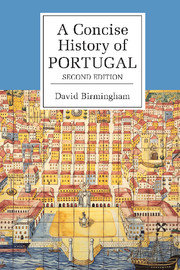Book contents
- Frontmatter
- Dedication
- Contents
- List of illustrations
- Introduction
- 1 Peoples, cultures and colonies
- 2 Rebellion and independence in the seventeenth century
- 3 The golden age and the earthquake in the eighteenth century
- 4 Brazilian independence and the Portuguese Revolution
- 5 The bourgeois monarchy and the republicans
- 6 The dictatorship and the African empire
- 7 Democracy and the European Community
- The houses of Avis, Beja and Habsburg
- The houses of Braganza and Braganza-Saxe-coburg
- Republican presidents
- Select source materials
- Selected works published since 1990
- Further reading in English
- Index
7 - Democracy and the European Community
Published online by Cambridge University Press: 05 June 2014
- Frontmatter
- Dedication
- Contents
- List of illustrations
- Introduction
- 1 Peoples, cultures and colonies
- 2 Rebellion and independence in the seventeenth century
- 3 The golden age and the earthquake in the eighteenth century
- 4 Brazilian independence and the Portuguese Revolution
- 5 The bourgeois monarchy and the republicans
- 6 The dictatorship and the African empire
- 7 Democracy and the European Community
- The houses of Avis, Beja and Habsburg
- The houses of Braganza and Braganza-Saxe-coburg
- Republican presidents
- Select source materials
- Selected works published since 1990
- Further reading in English
- Index
Summary
The April revolution of 1974 brought a ray of happiness to Portugal and dispelled the melancholia which had been its social hallmark for so long. The mournful fado songs were confined to tourist spots and the liberated generation threw itself into twentieth-century beat music. The Lisbon book fair flooded Avenida da Liberdade with ideas that had previously been available only under the counter, and publishing houses translated instant paperbacks on such forbidden subjects as psychology and social history as well as disseminating Marxism and modern fiction. The communist party organised enormous summer festivals to which the most famous of the world's musical groups were invited and huge crowds spent balmy nights wandering among the hundreds of acres of stalls eating, drinking, listening and fearlessly fraternising. In the euphoria there was little room for recrimination and persecution though a few secret policemen were exposed and incarcerated and some successful members of the business community found it expedient to follow a handful of politicians into temporary exile in Brazil. The soldiers found it as difficult as their predecessors had in 1926 to achieve a stable form of government and a few aspired to replace the monetarist certainties of the old order with new Marxist certainties.
- Type
- Chapter
- Information
- A Concise History of Portugal , pp. 185 - 203Publisher: Cambridge University PressPrint publication year: 2003

